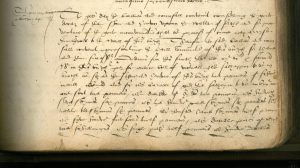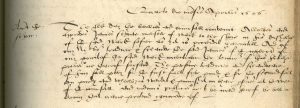As part of the year of ‘Coast and Waters’, our document of the month for February focuses on improvements to Stirling Harbour from 1603-1606.
Here at Stirling Archives, we hold the historic records of Stirling Burgh. This collection comprises a vast resource of local government records dating back to 1360, with the earliest Court records beginning in 1519 and the Council minutes from 1597.
Thanks to the preservation and cataloguing of this collection here at the archives, we can trace a good detailed history of the harbour all the way back to the 17th century.
On 19th April 1603, the Bailies and Town Council of Stirling met to discuss ‘the great decay of their shore and heavin upon the water forth’. At the end of this meeting, they agreed that the Master of Works, Mr James Shorte, was to begin work on an improved quayside and pier on the River Forth.
Improvements to the harbour, however, required money. A quick way to raise funds was to increase the anchorage and shore dues. This meant that there was a tax increase on goods coming into and out of the harbour.
The goods hit with a tax increase are listed in the minutes and show that cloth, cow hides, sheep skin and goat skins were some of the main products going out of Stirling. This is unsurprising given that skinners and weavers were some of the most important people in town and part of the seven incorporated trades in the area.
Here are some examples:
- Each thousand lamb skins, twelve pennies
- Each hundred knapple , six pennies (oak used for making casks)
- Each tun of wynne, sixteen pennies
- Each twenty tod skins, six pennies (Fox skins)
- Each double pack of cloth, two shillings
Work starts to take place at the harbour but in April 1606 the Town Council report that all is not well. The effort and progress of the harbour by the Master of Work James Shorte is criticised by the public. In response to this criticism, the Town Council defend James Shorte and state that:
‘Any neighbour traduce or slander the said James of neglect of any point of the said work…the person, traducer and slanderer of him, shall pay for the first fault fife pounds and for the second fault ten pounds’.
In short, if anyone in the town criticises or slanders James Shorte, they will be hit with a hefty fine of five pounds, which will then be doubled to ten pounds if the slander continues. From the Council records it looks like the work was completed a year later in 1607.

